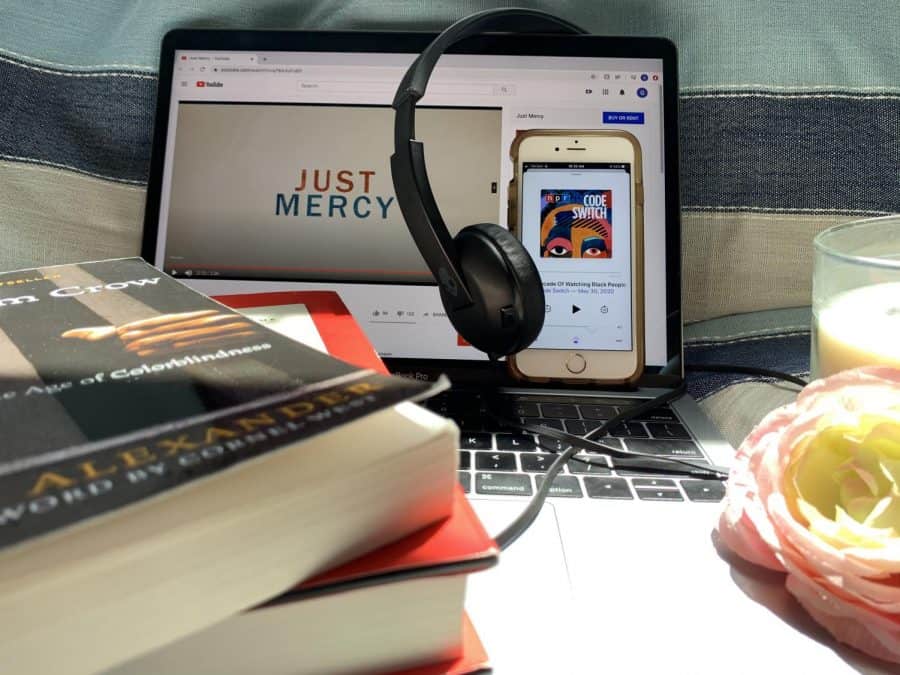Culture Picks: Your racism self-education starter kit
Garrett Kennedy | @garrettkennedy
“Just Mercy” and the NPR podcast “Code Switch” are both great starting points for white people who want to learn about structural racism—especially for those who aren’t much for reading.
June 25, 2020
The murder of George Floyd at the hands of white police officer Derek Chauvin sparked protests across America and highlighted for many non-Black Americans that Black people in America are still facing the debilitating effects of systemic racism. From direct violence at the hands of police to a lack of generational wealth, there are many systemic problems facing the Black community. One way to start fixing those problems is by learning about them.
As members of the University of Alabama community, we have an added responsibility to learn. Our school that was built by slave labor has ignored many incidents of racism affecting marginalized groups on campus and is just now beginning to consider renaming the buildings that memorialize racists. It is important to be informed about the history of the institution we attend if we want to make it a fair and equitable place of learning.
If you are looking for resources to educate yourself on the United States’ history with slavery, racism, and the continued systemic oppression of Black people, you are in luck. There are thousands of books, movies, documentaries, websites, TV shows, podcasts, articles, online courses, social media influencers and even TikToks with eye-opening information. These resources can seem overwhelming, so here are a few ideas to get you started.
Take a course. Just like almost any other subject, you can learn about racism in America through an online course. This is an easy way to spread out the work and make sure that you are doing it consistently.
Rachel Cargle has two great options. #Dothework is a free 30-day online course “designed to be an eye opener and a call to action for those who seek to be allies to black women.” She also leads The Great Unlearn on Patreon for as low as $5 a month, offering monthly coursework to start unlearning implicit racial biases.
Layla F. Saad has written “Me and White Supremacy: A 28-Day Challenge to Combat Racism, Change the World, and Become a Good Ancestor.” The book challenges readers to understand their participation in White supremacy and White privilege. Saad offers courses teaching different forms of allyship on her Good Ancestor Academy through Masterclass. Saad also hosts a podcast sharing her discussions with “change-makers and culture-shapers,” so she is really doing a bit of everything.
Join a book club. You could read a book on your own, but you’re more likely to finish if you have a friend reading with you. Plus, a book club is a great way to share the learning with others.
“The New Jim Crow” by Michelle Alexander is a New York Times Bestseller and discusses how the current system of mass incarceration in the U.S. came about, how it impedes racial justice and how it forces many Black Americans into a “lower caste”. The book has been critically acclaimed and is an important read for anyone looking to understand the issues facing the Black community today.
“Between the World and Me” by Ta-Nehisi Coates is written as a letter to Coates’ son. This book explores America’s history and what it means to be Black in America today. It is beautifully written and is also a New York Times Bestseller with several other accolades.
Have a family movie night. Conversations about race and racism with family can be difficult, but that does not mean you should avoid discussing them. Something as simple as watching a movie highlighting the struggles Black Americans face could help you and your family learn about these issues together.
Check out “13th” directed by Ava Duvernay. This film was nominated for the Documentary Feature Oscar in 2017 as well as several other awards. 13th artfully weaves together interviews and shocking data to illustrate the scope and effects of mass incarceration in America. It is available to watch on Netflix.
“Just Mercy” is also well worth watching, especially because it is free for the month of June. This movie is adapted from the book “Just Mercy” by Bryan Stevenson, focusing on his work founding the Equal Justice Initiative in Montgomery and fighting for human rights. The movie illuminates the struggle for true justice in the American criminal justice system.
Find a great podcast to keep up with. There are many podcasts covering a variety of topics. Listening to a podcast is a great way to absorb new information while going about your day. You can easily listen to a podcast at breakfast or while exercising.
The “1619” podcast presented by Nikole Hannah-Jones is a continuation of The New York Times’ The 1619 Project. Both examine the history of American slavery and how slavery has touched virtually every aspect of modern American life.
“Code Switch” is a hugely popular podcast on NPR that is hosted by journalists of color. This podcast has been creating content since 2016, so there are over two hundred episodes available now. You can start by listening to recent episodes like “A Decade Of Watching Black People Die” or “Why Now, White People?” which are closely related to the current protests.
Follow some Black activists on Instagram. Instagram can be a great learning tool, and there are many creators putting out great educational content. Almost all of the Black leaders that are mentioned in this article can be found on Instagram, so make sure to look them up as well.
Brittany Packnett Cunningham @mspackyetti. Cunningham has done many amazing things, including working on Obama’s task force on policing, co-founding Campaign Zero to end police violence, and co-hosting the political podcast “Pod Save The People“. She is currently an NBC News and MSNBC Contributor, and she is also working on a book.
Tamika D. Mallory @tamikadmallory. Mallory has held many roles including Executive Director of the National Action Network, co-chair of the 2017 Women’s March on Washington and co-founder of Until Freedom, a social justice organization fighting against systemic and racial injustice.
If you want to focus on the University of Alabama and the Tuscaloosa community as you learn, there are some great resources available locally.
Take a walking tour (or a “tour” from home).
For a chance to explore the history of the civil rights movement in Tuscaloosa, check out the Tuscaloosa Civil Rights History Trail. There are 18 locations in the downtown area highlighted on this tour, and the accompanying brochure details the historical significance of each one.
To understand the history of the University of Alabama’s campus itself, try Hallowed Grounds: Race, Slavery, and the University. There is a printable brochure or a touchscreen friendly version available as well.
UA professor Meredith Bagley created Autherine Lucy: Forgotten Hero, a campus tour focused specifically on the history of Autherine Lucy and her impact on our institution. Lucy was the first Black student to enroll at the University of Alabama.
Explore the Hallowed Grounds Project, which is tied to the Hallowed Grounds campus tour. Doctor Hilary N. Green has been conducting research since 2015 to unearth the University’s history. The results are available to peruse on the web page. This resource will help you comprehend the history of slavery at the University of Alabama and its continued impact on campus.










